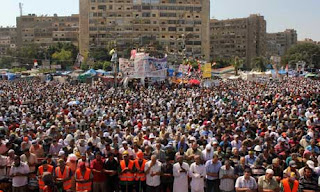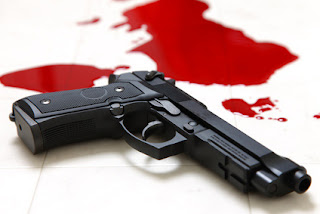Morsi supporters pledge to stand firm after massacre No one's going anywhere, say protesters camped outside mosque in east Cairo after at least 65 killed in nearby street
Supporters of the overthrown Egyptian president Mohamed Morsi
have pledged to maintain their weeks-old sit-in in east Cairo, despite
the massacre of scores of their comrades by state officials on Saturday.
At least 65 pro-Morsi protesters were shot dead during an eight-hour attack by police officers and armed men dressed in civilian clothes. An ambulance official said the death toll was 72; the Muslim Brotherhood said 66 had died and a further 61 were braindead in hospital.
"No one's going anywhere," said Abdel-Rahman Daour, one of several spokespeople at the sit-in outside the Rabaa al-Adawiya mosque. "We either have freedom or we die. We're not going to live in a country without freedom."
Tens of thousands of Morsi supporters have camped outside the mosque since late June when the president's overthrow began to seem likely. Egypt's interior minister has made it clear that he intends to clear Rabaa as soon as possible, and Saturday's massacre in a nearby street was considered an attempt to intimidate the protesters.
On Friday hundreds of thousands of anti-Morsi protesters turned out in support of a call by Egypt's army chief, Abdel Fatah al-Sisi, for a crackdown on what he called terrorists – a move sceptics saw as a veiled threat to protesters at Rabaa.
But Daour compared the defiant mentality at Rabaa to that of protesters in Tahrir Square during the 2011 uprising that toppled Hosni Mubarak. While Morsi's Muslim Brotherhood diverged from – and frequently condemned – secular-minded revolutionaries following the uprising, they were present in Tahrir before Mubarak's resignation.
"Just as we stood firm and protected Tahrir Square after the Camel Battle in 2011, we will protect Rabaa now," Daour said.
Gehad al-Haddad, a spokesman for the Muslim Brotherhood, said: "We're defiant as ever. We will have protests overnight and there are ongoing funerals today."
Khalil al-Anani, an expert on political Islam familiar with the thinking of the Brotherhood's leadership, said the Rabaa massacre would make Morsi supporters even more determined to stay on the streets until they received assurances about Islamists' long-term safety.
"What happened in Rabaa to some extent will change the equation to make them seek more guarantees that things will not go back to the Mubarak era," said Anani, an academic from Durham University based in Cairo.
"What I've heard is that they are willing negotiate everything, but with guarantees. And my analysis is that the only guarantee they can trust is that they will able to share power, because that is the only way they feel they can avoid a crackdown. They cannot leave without taking assurances that they will not be arrested [when they go home]."
Several senior Brotherhood officials were arrested following Morsi's removal, and their assets frozen. Morsi himself is under investigation for allegedly colluding with the Palestinian group Hamas during the 2011 revolution.
Following Saturday's shootings, leading members of the international community have expressed concerns about Egypt's predicament. Officials representing the UN secretary-general, Ban Ki-Moon, said Ban had called "on the interim authorities to assume full responsibility for the peaceful management of the demonstrations and ensure the protection of all Egyptians".
The EU foreign policy chief, Catherine Ashton, said she "deeply deplores" Saturday's deaths, while a senior representative of Human Rights Watch said the killings connoted a "criminal disregard" for human life.
The US secretary of state, John Kerry, released a statement noting his "deep concern about the bloodshed and violence", and the defence secretary, Chuck Hagel, contacted Sisi to "express deep concern about the security situation and recent violence in Egypt, and to encourage that restraint be exercised during this difficult period", his spokesman said.
The US recently cancelled a delivery of four F-16 jets to Egypt's army, in a show of disapproval at the army's behaviour since Morsi's fall, but other military aid efforts continue and the US refuses to term the army's removal of Morsi on 3 July
as a coup.
- The Guardian
At least 65 pro-Morsi protesters were shot dead during an eight-hour attack by police officers and armed men dressed in civilian clothes. An ambulance official said the death toll was 72; the Muslim Brotherhood said 66 had died and a further 61 were braindead in hospital.
"No one's going anywhere," said Abdel-Rahman Daour, one of several spokespeople at the sit-in outside the Rabaa al-Adawiya mosque. "We either have freedom or we die. We're not going to live in a country without freedom."
Tens of thousands of Morsi supporters have camped outside the mosque since late June when the president's overthrow began to seem likely. Egypt's interior minister has made it clear that he intends to clear Rabaa as soon as possible, and Saturday's massacre in a nearby street was considered an attempt to intimidate the protesters.
On Friday hundreds of thousands of anti-Morsi protesters turned out in support of a call by Egypt's army chief, Abdel Fatah al-Sisi, for a crackdown on what he called terrorists – a move sceptics saw as a veiled threat to protesters at Rabaa.
But Daour compared the defiant mentality at Rabaa to that of protesters in Tahrir Square during the 2011 uprising that toppled Hosni Mubarak. While Morsi's Muslim Brotherhood diverged from – and frequently condemned – secular-minded revolutionaries following the uprising, they were present in Tahrir before Mubarak's resignation.
"Just as we stood firm and protected Tahrir Square after the Camel Battle in 2011, we will protect Rabaa now," Daour said.
Gehad al-Haddad, a spokesman for the Muslim Brotherhood, said: "We're defiant as ever. We will have protests overnight and there are ongoing funerals today."
Khalil al-Anani, an expert on political Islam familiar with the thinking of the Brotherhood's leadership, said the Rabaa massacre would make Morsi supporters even more determined to stay on the streets until they received assurances about Islamists' long-term safety.
"What happened in Rabaa to some extent will change the equation to make them seek more guarantees that things will not go back to the Mubarak era," said Anani, an academic from Durham University based in Cairo.
"What I've heard is that they are willing negotiate everything, but with guarantees. And my analysis is that the only guarantee they can trust is that they will able to share power, because that is the only way they feel they can avoid a crackdown. They cannot leave without taking assurances that they will not be arrested [when they go home]."
Several senior Brotherhood officials were arrested following Morsi's removal, and their assets frozen. Morsi himself is under investigation for allegedly colluding with the Palestinian group Hamas during the 2011 revolution.
Following Saturday's shootings, leading members of the international community have expressed concerns about Egypt's predicament. Officials representing the UN secretary-general, Ban Ki-Moon, said Ban had called "on the interim authorities to assume full responsibility for the peaceful management of the demonstrations and ensure the protection of all Egyptians".
The EU foreign policy chief, Catherine Ashton, said she "deeply deplores" Saturday's deaths, while a senior representative of Human Rights Watch said the killings connoted a "criminal disregard" for human life.
The US secretary of state, John Kerry, released a statement noting his "deep concern about the bloodshed and violence", and the defence secretary, Chuck Hagel, contacted Sisi to "express deep concern about the security situation and recent violence in Egypt, and to encourage that restraint be exercised during this difficult period", his spokesman said.
The US recently cancelled a delivery of four F-16 jets to Egypt's army, in a show of disapproval at the army's behaviour since Morsi's fall, but other military aid efforts continue and the US refuses to term the army's removal of Morsi on 3 July
as a coup.
- The Guardian



Comments
Post a Comment